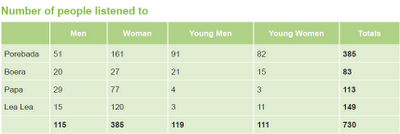From LNG Watch Papua New Guinea*
In 2011 Oxfam launched their LNG Impact Listening Project. In the words of Oxfam, the project's aim is to “understand people’s experiences and views of the impacts of the PNG LNG Project, and how they are responding to these impacts” (p.2). The listening project has focused on four villages affected by the LNG operation in Central Province; Lea lea, Papa, Boera and Porebada. A welcomed emphasis is given to the voice of women.

Oxfam's researchers encountered mixed feelings on the project. While some villagers were happy to have new employment and training opportunities, there were concerns over pay and conditions:
The youth that are working complain about the hard work and the salary, they work seven days per week in construction and general labour. Their contracts are with the contractor companies but they are being paid by Laba [Holdings]. When they first started work they got paid 800/900 [kina], now they get only 400 [kina]. The rates between the trainees that later work and those that are hired directly are different. People think this is because the money for the trainees goes through Laba and they get less. Why are they contracted to other companies but Laba pays them? The employees have already been on strike two or three times because of these issues. - Young man from Lea Lea (p.15)
Concerns were raised over perceived racism in the workplace: "The outsiders coming into the PNG LNG Project are allowed in the mess. We [as employees] are not allowed in the mess. Our lunches are given in the open places" (Man from Porebada, p.15).
Oxfam researchers also found that while people welcomed the benefits money generating opportunities brought to the village, there were worries over the effect of the project on community resources, community relations, and traditional life.
Men and women from Papa told Oxfam: “There are no teachers at schools as most of them have been employed by the project, which has resulted in the school being closed in the village” (p.16). A women from Porebada added: “Law and order is not carried out properly/correctly due to the experienced ones being engaged by the PNG LNG Project” (p.16).
People also felt the project was creating divisions in and between communities, as families struggled to obtain a fair share of the project benefits. A young man from Porebada remarks: “Because of the PNG LNG Project some of the clans or even families have broken up. They give first preference to their immediate families to be trained to work. Some are being left out — have never had any chance yet” (p.16).
This echoes the history of Bougainville, where communities experienced similar problem. Ex-Bougainville President, James Tanis, recalls: “The people started seeing each other not as brothers and sisters and clan mates with common ownership of wealth, but more as business competitors, with only the fittest to survive. This contributed to inequality, to social gaps and to hatred”.
And like on Bougainville, many villagers raised concerns over the increased abuse of alcohol, and the influx of outsiders. A woman from Porebada claims, “outsiders [are] coming in renting shops in the village. Liquor sold 24 hours. Making business in the village” (p.17).
Oxfam found there are also concerns in Central Province over how the gas pipeline and plant will affect the local environment - an anxiety that is shared by those in Madang confronting the Ramu nickel mine. A man from Boera remarked: “The pipeline may cause the sand to rise especially in areas where construction is done. The awareness on environmental issues on pipeline is not true” (p.17).
Indeed, in line with our own research in Hela (LNG Watch PNG forthcoming), Oxfam found that people feel as if ExxonMobil has promised a lot, but in fact has delivered very little. A woman from Papa claims: “ExxonMobil raised awareness with people in the village on the building of schools, health (aid post), water supply. Empty promises” (p.17). While a Man from Boera suggests: “A lot has been said and agreed about how the project will affect these infrastructures but we are yet to see things materialising — school, health centre, church and road” (p.17)
Oxfam’s report is sensitive, fair and well researched. While it is not entirely gloomy, it does raise serious concerns over the project. Sadly the media in PNG and Australia has predominantly focused on the project’s positive impacts, while the voice of everyday villagers has been silenced. Oxfam’s report is an important document that gives the concerns of villagers, and women in particular, a little more volume.
The report is available from the Oxfam website
* LNG Watch PNG - http://lngwatchpng.blogspot.com/
- rait man's blog
- Log in to post comments
